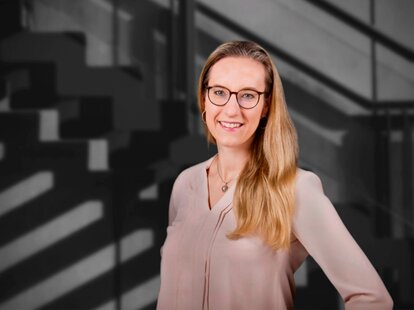#InternationalWomen'sDay2023
Interview with Niome Hüneke-Brown, new FNF Andean Countries project manager

Meet Niome Hueneke-Brown, the new project manager of the Friedrich Naumann Foundation for the Andean Countries
Hi Niome, since a few weeks ago you have been the project manager of the Friedrich Naumann Foundation for the Andean Countries, how have you taken on this new job challenge?
It is a great opportunity and a challenge for me. Fortunately I had the opportunity in 2019 to open this office, and I worked for two years alongside this team, which allowed me to learn a lot about their management, the strengths of the staff and the idiosyncrasies of the region. Today it is my turn to lead it and I know that we will do a great job thanks to them and our network of counterparts.

Today, March 8, is International Women's Day. What does this day mean to you?
For me it represents a day to reflect on women who still do not have access to opportunities that allow them to demonstrate their talent. Particularly in a region like the Andean countries, where gender gaps are very wide, from the workplace, to the burden of work at home and in the exercise of their freedoms.
If we go back a few years, what was your "ideal future" as a child?
Since I was a child I always liked helping people and getting to know different cultures. My parents are from different countries (Germany and England) and speak different languages, which always motivated me to learn about other realities and people from other latitudes. When I was young I remember supporting the integration of migrants in Germany, advising them in filling out documents and finding work. They told me about very harsh realities in their countries. I think that experience had a great influence on my decision to dedicate myself to international cooperation projects.
In your experience, what are the challenges faced by women in management positions? Have you encountered obstacles in your career as a woman? If so, how did you overcome them?
I feel very fortunate to have had the opportunity to develop as a professional, something that my mother or grandmother could not access. In addition, I always received a lot of support from my bosses and my partner. The main obstacle was visiting countries that are far behind in the vindication of women's rights, where I had to maintain a balance, which represents a hidden cost for women. For example, not being able to take public transportation, planning how to return home avoiding being alone, not being able to stay at the office until late or dress in a certain way, these are barriers that consume time, resources and generate a hidden mental burden, which is invisible since we end up doing the same work.
What do you consider to be the most dangerous stereotype about women?
Due to the low presence of women in management positions, I sometimes feel that women lack role models, which discourages them from believing that they can continue to move up in a company or firm. I think this is a limiting factor in women's careers and further fuels the stereotype that we cannot lead teams or companies. More generally, I have the impression that women who devote a lot of time to their careers are often criticized for it, since it is assumed that they neglect their family or children. This generates a lot of pressure and causes several women to abandon their careers. Claudia Goldin, professor of economics at Harvard and a specialist in gender issues, mentions that one of the main problems is the flexibility required to maintain a career and a family.
Which gender inequality bothers you more than any other?
Clearly violence against women. We have to remember that women's rights are not a given around the world and that, unfortunately, women are often exposed to violence, stalking, coercion, assault and, in the worst cases, murder.
On the other hand, I am disturbed by the unequal burden of household work, especially the regression on this issue that occurred in many societies during the pandemic, where for many it was logical for women to take care of children, cook and clean. Women performed more care tasks during school and daycare closures and reduced their working hours more often.
International Women's Day is a day to reflect on women who still do not have access to opportunities that allow them to demonstrate their talents. Particularly in a region such as the Andean countries, where gender gaps are very marked, from the workplace, to the burden of work in the home and in the exercise of their freedoms.

We cannot change this world until individuals change.
If you could share dinner with a woman who inspired you, who would it be and why?
Hannah Arendt, because of her courage to speak her mind, particularly in opposition to totalitarian regimes.
Arendt had to flee first Germany and then France in 1941 from the Nazi regime. She arrives in the United States and faces a new existence in a foreign language. This life experience, living in terror, the absence of freedom and fleeing, the experience of arriving in a foreign world, seeing how intelligent people, even her friends, could support a tyranny, nourishes her work and her books. I always thought she was brilliant.
Can you share three words to describe being a woman?
Courage, communication, freedom.
Ayn Rand, renowned philosopher and writer, indicates that "The question is not who is going to let me, the question is who is going to stop me", in that sense, what do you think is the greatest challenge of being a woman in these times?
Studies show that women in leadership positions who are at the age of starting a family and caring for children, that is, between the ages of 30 and 49, have far fewer children than women who are not in a leadership position. It is definitely a challenge to share family duties in a couple in an equal and fair manner.
The slogan for International Women's Day 2023 is: "For an inclusive digital world: Innovation and technology for gender equality", how do you interpret this phrase and how can we contribute to make it a reality?
I hope that we can contribute to make this phrase a reality through our activities at the foundation. Last year we supported the WISE project in order to connect more women in Peru with the entrepreneurial ecosystem and recognize their leadership, it was an inspiring event and the Innovation and Entrepreneurship Center Hub UDEP of the University of Piura awarded the first and second place winners of the STEM Contest "WISE Peru 2022".
Editor's note: The WISE program, "Women in STEM" (Science, Technology, Engineering and Mathematics), seeks to promote women's entrepreneurship in science, technology, engineering and mathematics; encourage their development and access to financing, among other objectives.
Give us a slogan that accompanies you and inspires us...
We cannot change this world until individuals change.
Marie Curie, Polish-French physicist and chemist, 1867 - 1934,
Marie Curie received part of the Nobel Prize in Physics in 1903 and the Nobel Prize in Chemistry in 1911. At the Radium Institute in Paris, which she directed, she was committed to promoting women and foreign students.
Finally, Amelia Earhart; American aviator, shared this brilliant phrase: "The future belongs to those who believe in the beauty of their dreams", what advice would you give to the women of the future?
Defend their uniqueness and freedom of choice in making their life project a reality, and firmly oppose regimes and ideologies that restrict these freedoms and equal rights.
Furthermore, to understand that this search must be done without giving up, understanding their role as active subjects in society, without victimizing themselves or through an identity or tribal culture around being a woman. Being a woman is one more aspect of our lives, it is important, but it does not define us only. In falling into these ideas, we also forget that feminism must be intersectional (that includes women with temporary or permanent disabilities, ethnic or religious minorities and LGTBIQ+ women, etc.). In other words, the quest for equal rights does not start or end with the fact of being a woman. We must continue to fight for individual freedoms in every sense and equality before the law. On these days we commemorate those who fought for women's rights, but women must also recognize their importance in the struggle for the rights of other members of our society.